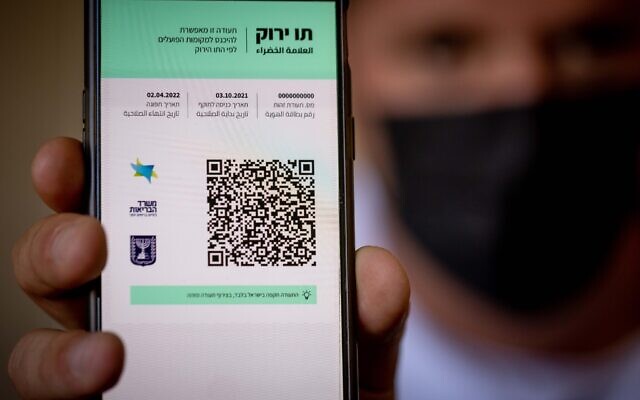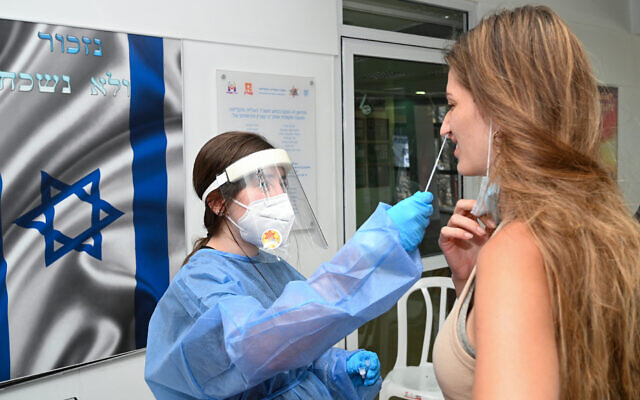Health ministry officials have said that cases of the Omicron coronavirus variant with no known source of infection have been reported in Israel, indicating that despite efforts to curb travel and keep the highly mutated version out of the country Tensions could flare up in communities, Israeli television reported Monday.
“It is possible that it has spread further than we thought,” a ministry source was quoted as saying by the Cannes public broadcaster.
According to the report, there were five to nine Omicron cases of unknown origin, most of them in Modi’in and Rainana.
The broadcaster also said that health ministry planners were warning that if the strain is deemed too contagious, Israel could see 15,000 daily coronavirus cases, spreading unchecked.
The ministry has so far confirmed 67 omicron infections in Israel. In its most recent update on the version, the ministry said it was working to verify another 80 cases with “high” suspicions that they were omicrons.
Separately, Channel 12 News reported that the government is working to push legislation that would give it the authority to ban people who enter places operated under green pass rules by presenting a negative COVID-19 test. are not immune to.
Such a change would limit access to many businesses and events to only Israelis who have proof of vaccination or have recently recovered from the coronavirus.
The report said that if the proposal is eventually approved, the government will not try to implement it immediately. A health ministry source told the network that there was currently no epidemiological justification for such a measure, but that it would be reserved for a situation in which coronavirus tests are unable to detect a new type.

Illustration of the new Green Pass in Jerusalem on October 4, 2021. (Jonatan Sindel/Flash90)
Earlier on Monday, the Ministry of Health announced that travel restrictions to the United Kingdom and Denmark, which are facing the Omicron outbreak, were delayed by 24 hours until midnight between Thursday and Friday, giving Israelis “extra time to prepare.” ” will allow.
On Sunday, Health Minister Nitzen Horowitz warned that additional countries would be classified as “red” in the coming days, but stressed that the government does not currently plan to ban international travel altogether. .
He also urged Israelis to refrain from non-essential travel.
Under new quarantine rules approved by the Knesset committee on Sunday, Israelis arriving from “red” countries must isolate in a state-run facility for at least 10 days. However, if they test negative for Omicron, they can be released into their homes to complete their quarantine.
According to Dr. Sharon Alroy-Preis, Head of Public Services at the Ministry of Health, Omicron is more contagious than previous variants and is better able to avoid vaccines. However, she also noted that this has resulted in fewer fatalities and less severe morbidity than previous COVID-19 outbreaks.
Her assessment is similar to that of the World Health Organization, which said on Sunday that Omicron spreads faster than the delta version, and reduces the vaccine’s efficacy, but produces less severe symptoms.
Of the 67 omicron infections confirmed so far in Israel, there is only one case of someone falling seriously ill – a non-vaccinated person who was hospitalized – and no deaths.

Example: A health care volunteer takes a swab sample from an Israeli woman at a testing center set up by Magan David Adom in the Golan Heights city of Katzrin on September 15, 2021. (Michael Gilady/Flash90)
On Sunday, Prime Minister Naftali Bennett warned of a possible lockdown “if we do not take immediate and difficult steps now.” But the prime minister said that “our overarching goal is to keep Israel’s economy as open as possible without lockdowns, and without reaching the limits of hospitals.”
According to the latest data from the Ministry of Health, 490 corona virus infections were confirmed on Sunday, of which 0.57 percent tested positive. The number of severe cases stood at 92 and the death toll stood at 8,223.
A total of 6,414,892 Israelis have received the first coronavirus vaccine, of which 5,792,471 have also received the second shot and 4,130,021 of them have received the third vaccine.